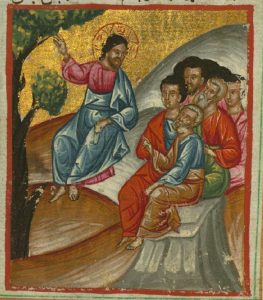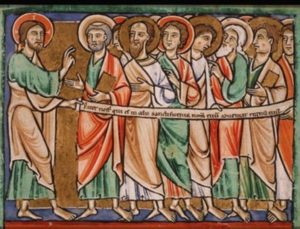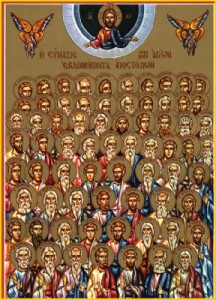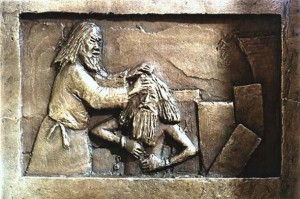Illuminations on the Lectionary readings for July 27, 2025 (Pentecost 7C/Proper 12)
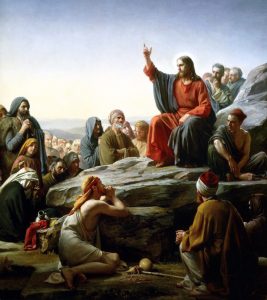
Sermon on the Mount, Jesus Praying. Oil painting by Carl Heinrich Bloch, Danish Museum of National History at Frederiksborg Castle, 1877. (Click image to enlarge.)
First Reading (Track One): Hosea 1:2-10
In Sunday’s Gospel, we hear Luke’s version of Jesus teaching the apostles to pray, using the familiar Lord’s Prayer. Listen for hints of God as a parent figure in the day’s other readings. Our Track One first reading opens a passage from the prophet Hosea that sounds even more grim and angry than the language we’ve been hearing from the prophet Amos in the past two weeks. Hosea tells a story that sounds very strange to modern ears: God orders him to marry and have a child with a prostitute, a shocking metaphor meant to warn Israel that it faces destruction as punishment for having forsaken God’s ways. But the final verse offers hope, promising that the descendants of Israel, as numerous as the sand of the sea, will be children of the living God.
First Reading (Track Two): Genesis 18:20-32
Last week’s Track Two first reading told the story of Abraham meeting three strangers in the desert and learning that he and his wife, Sarah, will have offspring as plentiful as the stars. Now Abraham has apparently become comfortable in a more direct relationship with God. He bargains and argues with the Creator in hope of saving Sodom from violent destruction. Why did Sodom deserve this? God’s wrath with the Sodomites did not have to do with sexual sin, as many assume, but with their selfish failure to be righteous. As the Prophet Ezekiel will later declare, “Sodom and her daughters had pride, excess of food, and prosperous ease, but did not aid the poor and needy.” This covenantal call to righteous action is at the center of the Hebrew Bible and carries on to Jesus.
Psalm (Track One): Psalm 85
Echoing Hosea’s description of an angry God, Psalm 85 sings of the grateful relief of a thankful people. In the exile, they had feared that they deserved God’s fury and wrathful indignation. But now they look forward to the mercy and salvation that they hope to receive from a God who remains faithful as a loving father, regardless of their sins. When we listen to God, the Psalmist sings, we hear mercy meeting truth while righteousness and peace join in a kiss.
Psalm (Track Two): Psalm 138
We often pray when we’re in need. In times of trouble and fear, we cry out in our helplessness and beg God to come to our aid. But how often do we remember to thank God? Whether we are thankful for a specific blessing or grateful for our blessings in general, we say thanks. As our mothers taught us, saying “thanks” is the right thing to do. Psalm 138 reminds us that God responds when we call. God loves us and is faithful to us. God’s right hand will save us; God’s steadfast love endures.
Second Reading: Colossians 2:6-15 (16-19)
The author of the letter to the Colossians, writing in Paul’s name, reminds the people to be thankful for the faith and blessings we have received through Christ. This letter to the church in Colossae, a Greek community of new Christians who may have been wrestling with the pagan beliefs of their culture, warns of false teachings. “Festivals, new moons or sabbaths,” the author points out, are only a shadow of what is to come through Christ.
Gospel: Luke 11:1-13
When Jesus teaches us to pray, he calls us to be righteous, just as the ancient prophets demanded of Israel: Honor God’s name, share our food, forgive our debts, do to others as we would have them do to us. Do these things and we help build God’s kingdom, not only in Heaven but right here on Earth. Having taught his followers this prayer, he didn’t stop there, but went on in the following verses to talk about prayer in language rich in metaphor. How do we read his words about a persistently demanding friend who won’t give up asking his neighbor for bread at midnight until the neighbor gives in? Perhaps this underscores the importance of sharing our bread and loving our neighbors no matter what the circumstances. Just as God opens the door when we knock, so should we do the same for our neighbor.

